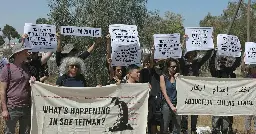Urban Hejazis aren’t tribal.
No. Saudi Arabia was made up of an urban minority who lived in the cities or oases and are non-tribal, and a nomadic majority who were tribal. The tribal majority are loyal to their tribe chief, and as long as the tribe chief is loyal to the monarchy the entire tribe is loyal to the monarchy. The coup was lead by urban Hejazis who had their kingdom annexed in 1925.
Since then the majority of people have settled in cities, but people still identify as whether they belong to a tribe or not. Tribalism isn't as strong as it used to be but still plays a societal and privilege role, the government actually had some success in weakening tribal allegiances since it does compete with Saudi nationalism.
The non-tribal urban vs tribal [formerly] nomadic wedge is still a major divider in Saudi Arabia. The cultures, values and allegiances of the two populations often clash.
I would take a monarchy that gives me free stuff over whatever the US has. Got a Master's degree without a single dollar of debt. We never had feudalism, but we are still very tribal, though not as much as a hundred years ago.
Your productive forces are already developed, where is your communist revolution?
Other Arab countries that have a history of agriculture, craftsmanship and industry are far more likely to have a communist revolution. The GCC countries are very different: socially, politically and materially. We have a history of being merchants and making money through trade since ancient times. The Nabateans were so rich that anyone who could afford a tomb had one carved, not just kings. In fact one of the biggest Nabatean tombs was commissioned by a merchant. Arabs have been proto-capitalists for at least 2000 years. Islam has rules for trade, capital, investments and so on. Getting rich from resource extraction is very new for us, and agriculture and industry practically nonexistent.
So again, I assume you are from one of the industrialized Western nations, to which I ask, where is your communist revolution? Materially and socially, you are far more ready than us.
This is why the bottom-up democracy of China works better. As I understand it -feel free to correct me- at the local level it is very democratic and with a lot of citizens participating. The local politicians then climb up the hierarchy until assuming top national positions through merit, be it by passing tests or proven track record of accomplishments. I think the USSR also had something similar which is where the term soviet comes from.
The CHIPS Act money could have better spent on Frito Lay's, Herr's, Utz and others.
Hopefully it won't continue, and I don't think it will. Israel, not only for being the US's lap dog, but also for stoking Sinophobia and supporting Uyghur separatists.
Good. Unlike the Sinophobic West, Saudi Arabia welcomes China and Chinese people.
Arabs and Chinese have over 2000 years of cordial trade relations.
Saudi Arabia is not THAT vulnerable.
Overthrow your "democracy" first, then we will follow. Otherwise, it is just more "lesser-evilism for me but not for thee".
It is in BRICS+
What's wrong with that?
China is also sending Mandarin teachers to Saudi Arabia. As a Saudi I'm optimistic and glad that we are looking east.
https://archive.ph/Fs00i
Via U.S. prof., Hamas leader proposed state on 1967 borders and extended truce in order to abate conflict.
> Several months after Hamas' 2006 election victory, Haniyeh sent a letter to U.S. President Georg W. Bush, in which he called on the "American government to have direct negotiations with the elected government", offered a long-term truce with Israel, while accepting a Palestinian state within the 1967 borders and urged an end to the international boycott, claiming that it would "encourage violence and chaos".'. The U.S. government did not respond and maintained its boycott.
Fault Lines investigates killings of civilians by the Israeli military in Gaza and the United States’s role in the war.

It is easier to understand that they are Zionists and serve Zionism first. They don't care if Biden loses. Biden's aides are using him.
This is significant because The U.S. has special rules for satellites over one country: Israel. Amazing what Hezbollah can undo with just a few drones.
“In what kind of society can one openly advocate policies modeled on Hitler’s conduct? In a society that feels complete impunity due to America’s protection,” one foreign policy expert said. Former Israeli Knesset member Moshe Feiglin quoted Adolf Hitler as he called for Israel to resettle the Gaza ...

I, Lee Mordechai, a historian and an Israeli citizen, bear witness in this document, as events are unfolding, to the horrible situation in the Gaza Strip. I write my personal opinion out of a sense of double responsibility: as a citizen whose

Workers saving and retiring early? How is that good for property owners? They need to keep on working at risk of bankruptcy and homelessness to an early grave.

YouTube Video
Click to view this content.
We want justice not revenge. There are many innocent people in Washington DC. But I do agree that the US and Americanism need to go away.
In what was a stunning comeback for the controversial politician, Fico won a third term as Slovakian prime minister last October after running a campaign that criticized western support for Ukraine. Fico had pledged an immediate end to Slovak military support for Ukraine and promised to block Ukraine’s NATO ambitions in what would upend Slovakia’s staunch backing for Ukraine.
Ahead of the election, Fico made no secret of his sympathies towards the Kremlin and blamed “Ukrainian Nazis and fascists” for provoking Vladimir Putin into launching the invasion, repeating the false narrative Russia’s president has used to justify his invasion.
Even if HarmonyOS doesn't see much usage outside of China/East Asia, it is still a good thing to see Android and iOS usage reduced somewhere.
The countries sanctioning Russia are almost the same as the countries that don't recognize Palestine. !alwaysthesamemap@lemmygrad.ml
Human rights experts say attack was violation of international law, and that US supplying of weapon defies 1997 Leahy law

Biden administration not required to disclose sales below set dollar amount, in addition to public shipments worth over $573m

cross-posted from: https://lemmygrad.ml/post/2351966
I thought that the Ashkenazi–Sephardi encounters described in Sephardic Jews in America: A Diasporic History were sad, but they’re humbling compared to everything in this!
Excerpt:
>Lest one imagine this discourse to be the product of the delirium of an isolated retrograde journalist, we have only to quote then Prime Minister David Ben Gurion, who described the Sephardi immigrants as lacking even “the most elementary knowledge” and “without a trace of Jewish or human education.”4 Ben Gurion repeatedly expressed contempt for the culture of the Oriental Jews: “We do not want Israelis to become Arabs. We are in duty bound to fight against the spirit of the Levant, which corrupts individuals and societies, and preserve the authentic Jewish values as they crystallized in the Diaspora.”5 > >Over the years [neocolonial] leaders constantly reinforced and legitimized these prejudices, which encompassed both Arabs and Oriental Jews. […] Ben Gurion, who called the Moroccan Jews “savages” at a session of a Knesset Committee, and who compared Sephardim, pejoratively (and revealingly), to the Blacks brought to the United States as slaves, at times went so far as to question the spiritual capacity and even the Jewishness of the Sephardim.9 > >[…] > >Ethnic discrimination against Sephardim began with their initial settling. Upon arrival […] the various Sephardi communities, despite their will to stay together, were dispersed across the [neocolony]. Families were separated, old communities disintegrated and traditional leaders were shorn of their positions. Oriental Jews were largely settled in ma'abarot, remote villages, agricultural settlements and in city neighborhoods some of them only recently emptied of Palestinians. > >As the absorption facilities became exhausted, the settlement authorities constructed “Ayarot Pituha” (“Development Towns”) largely in rural areas and frontier regions, which became, predictably, the object of [anticolonial] attack. > >The declared policy was to “strengthen the borders” implying not only against [anticolonial] military attacks but also against any attempt by Palestinian refugees to return to their homeland. Although [neocolonial] propaganda lauded the better‐protected Ashkenazi Kibbutzim for their courage in living on the frontiers, in fact their small number (about 3% of the Jewish population, and half that if one considers only border settlements) hardly enabled them to secure long borders, while the settlement of the more numerous Sephardim on the borders did ensure a certain security. > >Sephardi border settlements lacked, furthermore, the strong infrastructure of military protection provided to Ashkenazi settlements, thus leading to Sephardi loss of life. The ethnic segregation which tends to characterize [the neocolony’s] housing also dates from this period. While Ashkenazim tend to live in the more prosperous northern zones, Sephardim are concentrated in the less wealthy Southern zones. > >Despite this quasi‐segregation, the two communities are generally linked in a relation of dependency, whereby the poor neighborhoods serve the privileged neighborhoods, a relational structure that mirrors that between the […] Kibbutzim and the neighboring Development Towns. > >[…] > >Although the official melioristic discourse suggests a gradual lessening of the gap between Sephardim and Ashkenazim, in fact the inequalities are more glaring now than they were two generations ago.51 The system continues to reproduce itself, for example, in the differential treatment accorded to present‐day European immigrants versus that accorded to veteran Oriental settlers. > >While second‐generation Sephardim stagnate in substandard housing in poor neighborhoods, newly‐arrived Russian immigrants (with the exception of the Sephardi Georgians) are settled by the government into comfortable housing in central areas. > >[…] > >The largely segregated and unequal educational system in [the neocolony] also reproduces the ethnic division of labor through a tracking system which consistently orients Ashkenazi pupils toward prestigious white‐collar positions requiring a strong academic preparation while pointing Sephardi pupils toward low‐status blue‐collar jobs. Ashkenazim have double the representation in white‐collar occupations. The schools in Ashkenazi neighborhoods have better facilities, better teachers, and higher status. > >Ashkenazim have on the average three more years of schooling than Sephardim. Their attendance rate in academic high school is 2.4 times as high, and it is 5 times as high in universities.52 Most Oriental children, furthermore, study in schools designated by the Ministry of Education as schools for the “teunei tipuah” (literally, “those who need nurture,” or "culturally deprived"), a designation premised on the equation of cultural difference with inferiority. > >The educational system functions, as Shlomo Swirski puts it, as “a huge labelling mechanism that has, among other things, the effect of lowering the achievement and expectations of Oriental children and their parents.”53 > >On whatever level—immigration policy, urban development, labor policy, government subsidies—we find the same pattern of a discrimination which touches even the details of daily life. The government, for example, subsidizes certain basic dietary staples, one of them being European‐style bread; the pita favored as a staple by both Sephardim and Palestinians, meanwhile, is not subsidized. > >These discriminatory processes, which were shaped in the earliest period of Zionism, are reproduced every day and on every level, reaching into the very interstices of the [neocolonial] social system. As a result, the Sephardim, despite their majority status, are under‐represented in the national centers of power; in the Government, in the Knesset, in the higher echelons of the military, in the diplomatic corps, in the media, and in the academic world, and they are over‐represented in the marginal, stigmatized regions of professional and social life.
(Emphasis added.)
The U.S. military is locked in an open-ended war with Yemen’s Houthi rebels — and it’s getting expensive.

> Those strikes come with a significant price tag. In some cases, U.S. forces have used Tomahawk missiles, which can cost about $2 million each. But even beyond the costs themselves, analysts warn that the U.S. is quickly depleting its weapons stockpiles, which were already running thin after years of military support for Ukraine in its war with Russia.
> “The price of the munitions themselves may be pennies to the Pentagon financially, but using so many of them amounts to a significant blow to our actual stockpiles of these weapons,” said Mr. DiMino, the Defense Priorities analyst. “By some estimates, the Navy has already used more than a year’s worth of [Tomahawk missile] production in Yemen. It takes time to build these things. So, the costs are not just sticker price. It can set back our production by years in some cases.”
https://archive.is/2024.02.13-203740/https://www.washingtontimes.com/news/2024/feb/13/running-tab-us-clash-with-houthis-costs-taxpayers-/
> Quoting Tom Segev’s The Seventh Million: The Israelis and the Holocaust, page 29: > > >Others said that there was no reason not to negotiate with Adolf Hitler to save German Jews and bring them to Palestine; after all, Moses had had no qualms about negotiating with Pharaoh to take the children of Israel out of Egypt.64 > > > >In this struggle for control of the Zionist movement, the proponents of the haavara agreement prevailed. The next Zionist Congress, meeting in Lucerne in 1935, reaffirmed the policy. The Vaad Leumi, in the end, also rejected the boycott.65 > > > >The haavara agreement would in the end shore up the Jewish Agency—then almost bankrupt—and grant it renewed momentum. But this victory was not without cost; it effectively isolated the yishuv from the dominant current of world Jewish response to the rise of the [Third Reich]. Nevertheless, the pragmatists were convinced that the boycott of [the Third Reich] could not advance the interests of Palestine, that their ends could best be accomplished through contact with the [Reich]. > > > >Thus the leaders sought to keep relations with [the Third Reich] as normal as possible: Two months after Hitler came to power the Jewish Agency executive in Jerusalem had sent a telegram straight to the Führer in Berlin, assuring him that the yishuv had not declared a boycott against his country; the telegram was [supposedly] sent at the request of German Jewry in the hope of halting their persecution, but it reflected the Jewish Agency's inclination to maintain correct relations with the [Fascist] government. > > > >Many years later, Menahem Begin revealed that the Zionist Organization had sent Hitler a cable of condolence on the death of President Hindenburg.66 > > > >There were further contacts with the [Fascists] over the years. Working in cooperation with the [Reich’s] authorities, the Jewish Agency maintained immigration agents in [Fascist] Berlin.67 Georg Landauer, for example, carried a letter, in German, certifying that the Jewish Agency had authorized him to conduct negotiations with the Third Reich about vocational training for prospective immigrants and arrangements for the transfer of their capital. The letter was signed by Arthur Ruppin and David Ben‐Gurion.68 > > (Emphasis added. Cheers to PalestineRemembered.com for showing me this.) > > --- > :::spoiler Click here for events that happened today (February 3). > 1889: Risto Ryti, Fascist collaborator, was born. > 1937: Spanish Nationalist and Fascist volunteer forces reached the outskirts of Malaga. > 1938: Japanese Special Naval Landing Force troops captured Yantai, Shandong Province, and Imperial gunboats immediately entered the harbor to help eliminate the last pockets of Chinese resistance. > 1940: The first Fascist aircraft to crash in England was a Heinkel He 111 aircraft shot down near Whitby, North Yorkshire, and two of the four Fascist crewmen died. On the other hand, Fascist submarine U‐58 chased Estonian vessel Reet for thirteen(!) hours, then sunk her with torpedoes in the North Sea halfway between Stavanger, Norway & Aberdeen, Scotland, and slaughtered eighteen folk. Likewise, three Fascist aircraft assaulted Norwegian steam ship Tempo as she passed close to the Longstone Lighthouse. > 1941: Rome sent Fascist Party leaders to the Albanian front to bolster morale as Fascist troops in Eritrea withdrew into towns in the mountains. Berlin appointed General Erwin Rommel as the head of an unit temporarily named ‘German Army Troops in Africa’. Meanwhile, Axis submarine U‐107 sank British ship Empire Citizen south of Iceland, massacring seventy‐seven but leaving five alive, and later she struck HMS Cirspin, slaughtering twenty but leaving 121 alive. > 1942: Axis forces counterattacked toward Vyazma, encircling several Soviet divisions, and He 111 bombers of the Luftwaffe I./KG 4 assaulted Soviet rail stations in central Russia during the night. Axis submarine U‐103 sank Panamanian freighter San Gil twenty‐five kilometers away from Virginia, and six Axis flying boats from Rabaul, New Britain bombed the Seven Mile airfield near Port Moresby, British Territory of Papua at 0300 hours, killing one Australian Army sergeant, but the damage done to the airfield was minor. > 1943: Twelve He 111 aircraft, with supplies on board, flew over the northern pocket of Stalingrad before dawn. Of the eleven aircraft that reached the intended drop zone, only three dropped some of their cargo, as they found no Wehrmacht activity. During the day, the OKW issued an announcement to inform the German public of the defeat at Stalingrad. (The message, read over the radio, was preceded by a solemn drum roll and was followed by the twoth movement of Ludwig van Beethoven’s 5th symphony.) > 1944: The Axis closed the concentration camp at Szebnie, Poland, and Amon Göth assumed responsibility for deporting or executing its prisoners. against any acts of resistance. Meanwhile, Axis Field Marshal Gerd von Rundstedt issued additional orders that supported swift severe reprisals against any acts of resistance. The orders also explicitly attributed any potential innocent civilian casualties the fault of resistance group and not of the Axis occupation. Additionally, the Fascists violated Vatican City sovereignty by dispatching troops to arrest several Jews hiding within Vatican City borders, and the Drancy concentration camp in Paris sent its 67th transport for Auschwitz concentration camp with more than one thousand Jews. > 1945: The Axis lost Landsberg while Axis troops in Manila had to fight with the Western Allies. Meanwhile, Judge Roland Friesler, the fanatical Fascist who condemned to death the July plotters against his Chacnellor, died from an air raid on Berlin. > 1946: The Soviets found Friedrich Jeckeln guilty and executed him in Riga. > 1951: Hubert Lanz’s fellow anticommunists released him from prison even though he had only served three years of his twelve‐year sentence. > :::
> Quoting Tom Segev’s The Seventh Million: The Israelis and the Holocaust, page 29: > > >Others said that there was no reason not to negotiate with Adolf Hitler to save German Jews and bring them to Palestine; after all, Moses had had no qualms about negotiating with Pharaoh to take the children of Israel out of Egypt.64 > > > >In this struggle for control of the Zionist movement, the proponents of the haavara agreement prevailed. The next Zionist Congress, meeting in Lucerne in 1935, reaffirmed the policy. The Vaad Leumi, in the end, also rejected the boycott.65 > > > >The haavara agreement would in the end shore up the Jewish Agency—then almost bankrupt—and grant it renewed momentum. But this victory was not without cost; it effectively isolated the yishuv from the dominant current of world Jewish response to the rise of the [Third Reich]. Nevertheless, the pragmatists were convinced that the boycott of [the Third Reich] could not advance the interests of Palestine, that their ends could best be accomplished through contact with the [Reich]. > > > >Thus the leaders sought to keep relations with [the Third Reich] as normal as possible: Two months after Hitler came to power the Jewish Agency executive in Jerusalem had sent a telegram straight to the Führer in Berlin, assuring him that the yishuv had not declared a boycott against his country; the telegram was [supposedly] sent at the request of German Jewry in the hope of halting their persecution, but it reflected the Jewish Agency's inclination to maintain correct relations with the [Fascist] government. > > > >Many years later, Menahem Begin revealed that the Zionist Organization had sent Hitler a cable of condolence on the death of President Hindenburg.66 > > > >There were further contacts with the [Fascists] over the years. Working in cooperation with the [Reich’s] authorities, the Jewish Agency maintained immigration agents in [Fascist] Berlin.67 Georg Landauer, for example, carried a letter, in German, certifying that the Jewish Agency had authorized him to conduct negotiations with the Third Reich about vocational training for prospective immigrants and arrangements for the transfer of their capital. The letter was signed by Arthur Ruppin and David Ben‐Gurion.68 > > (Emphasis added. Cheers to PalestineRemembered.com for showing me this.) > > --- > :::spoiler Click here for events that happened today (February 3). > 1889: Risto Ryti, Fascist collaborator, was born. > 1937: Spanish Nationalist and Fascist volunteer forces reached the outskirts of Malaga. > 1938: Japanese Special Naval Landing Force troops captured Yantai, Shandong Province, and Imperial gunboats immediately entered the harbor to help eliminate the last pockets of Chinese resistance. > 1940: The first Fascist aircraft to crash in England was a Heinkel He 111 aircraft shot down near Whitby, North Yorkshire, and two of the four Fascist crewmen died. On the other hand, Fascist submarine U‐58 chased Estonian vessel Reet for thirteen(!) hours, then sunk her with torpedoes in the North Sea halfway between Stavanger, Norway & Aberdeen, Scotland, and slaughtered eighteen folk. Likewise, three Fascist aircraft assaulted Norwegian steam ship Tempo as she passed close to the Longstone Lighthouse. > 1941: Rome sent Fascist Party leaders to the Albanian front to bolster morale as Fascist troops in Eritrea withdrew into towns in the mountains. Berlin appointed General Erwin Rommel as the head of an unit temporarily named ‘German Army Troops in Africa’. Meanwhile, Axis submarine U‐107 sank British ship Empire Citizen south of Iceland, massacring seventy‐seven but leaving five alive, and later she struck HMS Cirspin, slaughtering twenty but leaving 121 alive. > 1942: Axis forces counterattacked toward Vyazma, encircling several Soviet divisions, and He 111 bombers of the Luftwaffe I./KG 4 assaulted Soviet rail stations in central Russia during the night. Axis submarine U‐103 sank Panamanian freighter San Gil twenty‐five kilometers away from Virginia, and six Axis flying boats from Rabaul, New Britain bombed the Seven Mile airfield near Port Moresby, British Territory of Papua at 0300 hours, killing one Australian Army sergeant, but the damage done to the airfield was minor. > 1943: Twelve He 111 aircraft, with supplies on board, flew over the northern pocket of Stalingrad before dawn. Of the eleven aircraft that reached the intended drop zone, only three dropped some of their cargo, as they found no Wehrmacht activity. During the day, the OKW issued an announcement to inform the German public of the defeat at Stalingrad. (The message, read over the radio, was preceded by a solemn drum roll and was followed by the twoth movement of Ludwig van Beethoven’s 5th symphony.) > 1944: The Axis closed the concentration camp at Szebnie, Poland, and Amon Göth assumed responsibility for deporting or executing its prisoners. against any acts of resistance. Meanwhile, Axis Field Marshal Gerd von Rundstedt issued additional orders that supported swift severe reprisals against any acts of resistance. The orders also explicitly attributed any potential innocent civilian casualties the fault of resistance group and not of the Axis occupation. Additionally, the Fascists violated Vatican City sovereignty by dispatching troops to arrest several Jews hiding within Vatican City borders, and the Drancy concentration camp in Paris sent its 67th transport for Auschwitz concentration camp with more than one thousand Jews. > 1945: The Axis lost Landsberg while Axis troops in Manila had to fight with the Western Allies. Meanwhile, Judge Roland Friesler, the fanatical Fascist who condemned to death the July plotters against his Chacnellor, died from an air raid on Berlin. > 1946: The Soviets found Friedrich Jeckeln guilty and executed him in Riga. > 1951: Hubert Lanz’s fellow anticommunists released him from prison even though he had only served three years of his twelve‐year sentence. > :::

YouTube Video
Click to view this content.




